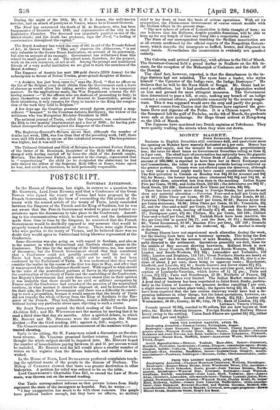POSTSCRIPT.
SkFORTUT AFTERNOON.
In the House of Commons, last night, in answer to a question from Mr. GRIFFITH, Lord JOHN RUSSELL said that a Conference of the Great Powers who signed the treaty of Vienna had been proposed by the French Government, with the view of reconciling the 92d article of the treaty with the second article of the treaty of Turin, lately concluded between the Emperor of the French and the King of Sardinia, but he was not aware that the Prerch Government wished to place any further re- strictions upon the discussions to take place to the Conference. Accord- ing to the communications which he had received, and the declaration§ made from time to time by the Emperor, he conceived that the French Government would be decidedly opposed to any measure that would be properly termed a dismemberment of Savoy. There were eight Powers who were parties to the treaty of Vienna, and he believed there was no doubt they would agree to Switzerland being likewise represented at the Conference.
Some discussion was also going on with regard to Sardinia, and also as to the manner in which Switzerland and Sardinia should appear in the Conference. The time for the meeting of the Conference, too, was matter of discussion ; but the French Government stated that they considered that a Conference could not possibly assemble until the treaty of Turin had been completed, which could not be until it had been confirmed by the Parliament of Turin. It was understood that they would consider the matter in the course of the first ten days in May, and after that it was proposed that the Conference should meet. With regard to what should be the state of the neutralized portions of Savoy in the interval between the confirmation of the treaty of Turin and the assembling of the Conference, her Majesty's Government had more than once stated that in their opinion it was desirable that there should be no civil or military occupation by France until the Conference had considered the question of the neutralized territory, in what manner it should be disposed of, and be hereafter held. On their side, the French Government said there was a difficulty in assent- ing to such a proposition, because it would assume that the treaty of Turin did not transfer the whole of Savoy from the King of Sardinia to the Em- peror of the French. They had, therefore, raised a difficulty on this point without laying any particular stress upon objecting to such a course.
Sir Joint TRELAWNY moved the third reading of the Church Rates Abolition Bill ; and Mr. Witrrissniz met the motion by moving that it be read a third time that day six months. After a spirited debate, in which Mr. BRIGHT and Mr. DisnAnm were the chief speakers, the House divided :—For the third reading, 235 ; against it, 226 ; majority, 9.
The Conservatives received the announcement of the numbers withpro.taseted cheering.
Early in the sitting, Sir M. FARQUHAR raised a discussion on the elec- toral returns. Mr. VILLIERS promised further returns. Lord STANLEY thought the whole subject should be inquired into. Mr. HENLEY hoped the number of householders paying between 41. and 5l. per annum would be included. Mr. BRIGHT said the bill would place a smaller number of voters on the register than the House believed, and smaller than he wished.
In the House of Peers, Lord DUNGANNON preferred complaints touch- ing the spiritual wants of the people in the diocese of Durham. The Bishop of CARLISLE. showed that there was greater destitution in other bishoprics. A petition for relief was ordered to lie on the table.
Lord GamtwoRTReS Charitable Uses Bill, to amend the Law of Mort, main, was thrown out on the second reading.


























 Previous page
Previous page